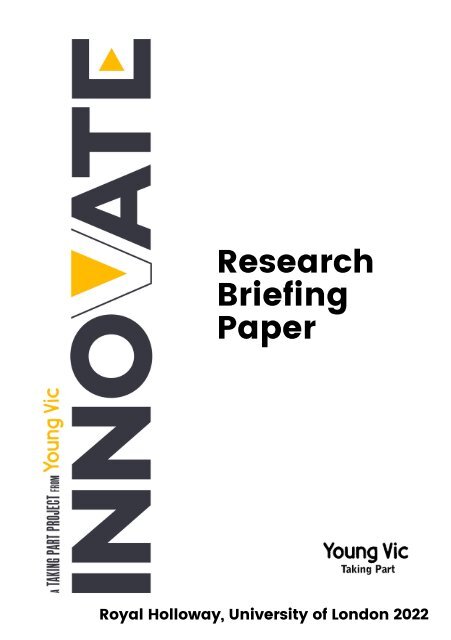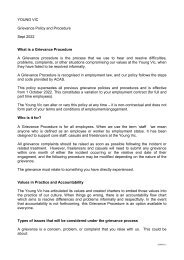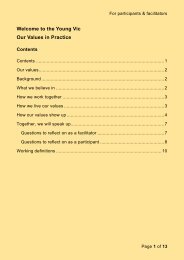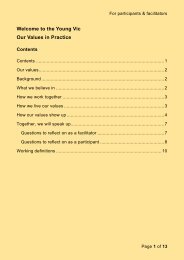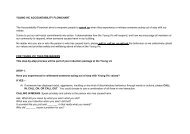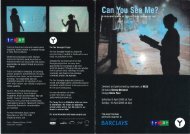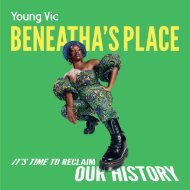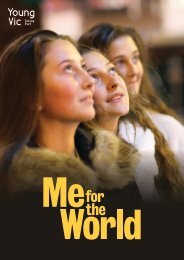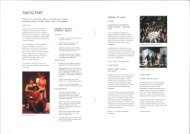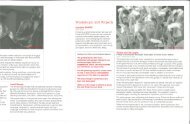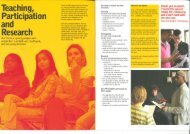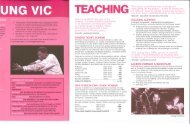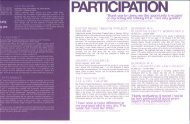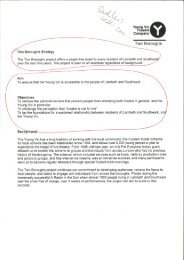INNOVATE Research Briefing Paper
You also want an ePaper? Increase the reach of your titles
YUMPU automatically turns print PDFs into web optimized ePapers that Google loves.
<strong>Research</strong><br />
<strong>Briefing</strong><br />
<strong>Paper</strong><br />
Royal Holloway, University of London 2022
TABLE OF<br />
CONTENTS<br />
01<br />
02<br />
03<br />
04<br />
05<br />
Introduction<br />
What are the aims of the research?<br />
Information Gathering<br />
What we have learnt so far?<br />
Recommendations<br />
06<br />
References<br />
07<br />
Appendices
INTRODUCTION<br />
<strong>INNOVATE</strong> was developed by Taking Part[1], the Young Vic’s creative engagement department,<br />
to support teachers to use creativity as a teaching tool. The programme aims to encourage pupils’<br />
engagement with school and learning by embedding creativity within the everyday curriculum<br />
in a way that is sustainable beyond the life of the programme. Artists collaborate with teachers<br />
to plan and adapt their lessons to incorporate a wide range of arts activities.<br />
<strong>INNOVATE</strong> is inspired by the influential work of Dorothy Heathcote (MBE) and Sir Ken<br />
Robinson. Together, their individual approaches to education (Heathcote’s drama for learning,<br />
which encouraged children to be playful, take responsibility and act pro-socially in exploring<br />
issues across the curriculum, and Robinson’s writing on the arts in schools, which advocated a<br />
broad and arts-rich curriculum focused on igniting curiosity through creative teaching) aligned<br />
with the ethos of Taking Part and underpinned the development of the programme.<br />
Secondary schools in the boroughs of Lambeth and Southwark were invited to submit an<br />
expression of interest to become an <strong>INNOVATE</strong> school in October 2020. This was followed by an<br />
application and interview process in which two schools were chosen: South Bank University<br />
Academy and Dunraven School.<br />
Six artists were recruited to work as Project Associates in the schools. Each from diverse arts<br />
disciplines, including theatre making, drama, dance, improvisation and film, but all of them<br />
sharing a vision of how creativity could help inspire learning. Visiting Associates were also<br />
commissioned to work in schools as part of the programme. This offered more diversity in terms<br />
of artists’ backgrounds and the kinds of artistic disciplines on offer and improved the ability to<br />
respond to the needs and requests of schools. Please see Appendix A for more details on the<br />
Project Associates and Visiting Associates.<br />
An Advisory Panel of experts from creative, cultural and educational sectors was convened to<br />
inform the development of the programme (see Appendix B). Their role is to act as critical friends,<br />
to contribute their expertise and experience and ensure the programme is being implemented<br />
effectively. Meetings happen typically once per term.<br />
[1] Shereen Jasmin Phillips, Director of Taking Part is credited with the concept of<br />
<strong>INNOVATE</strong>
As part of the programme’s implementation, orientation meetings were held with the schools’<br />
Senior Leadership Teams. Participating teachers also attended an induction meeting which<br />
supported discussions about <strong>INNOVATE</strong> and any questions about their involvement before the<br />
start of the intervention. These meetings, together with the orientation sessions, were organised<br />
and led by Taking Part’s Learning Producer[1]. In parallel to the meetings, Project Associates<br />
visited schools as part of ‘listening days’, which supported classroom observations, introductions<br />
with pupils and discussions with members of staff within the departments they were assigned to<br />
work in. Listening days also focused on planning lesson content and delivery with participating<br />
teachers.<br />
<strong>INNOVATE</strong> was introduced to Dunraven School and South Bank University Academy in<br />
September 2021(see Appendix C for a full timeline of project activity in Year 1). In March 2022,<br />
the Young Vic commissioned a two-year evaluation to find out what impact <strong>INNOVATE</strong> has on<br />
young people’s learning across all subjects. The evaluation is being carried out by Professor<br />
Helen Nicholson and Dr Yvonne Robinson at Royal Holloway, University of London. This<br />
briefing paper summarises the research underway.<br />
[1] Taking Part’s Learning Producer, Melanie Anouf, oversees implementation of <strong>INNOVATE</strong> in<br />
schools, supporting<br />
artists in their school placements and everyday management of the programme.
Schools<br />
Based in two inner-city London secondary schools - Dunraven School and South Bank<br />
University Academy, the research explores the process of embedding creativity across<br />
all parts of school life and the impact of this on teaching and learning.<br />
‘We are thrilled to be chosen to<br />
participate in the project and<br />
look forward to a productive<br />
and innovative partnership<br />
with The Young Vic. Dunraven<br />
always strives for 'Excellence<br />
for All' and we are excited to see<br />
how our work and planning<br />
with the artists can support our<br />
curriculum principles and how<br />
our students understand the<br />
stages of learning. As a school<br />
where the arts truly matter, we<br />
look forward to discovering and<br />
sharing with others what can be<br />
achieved when artists, teachers<br />
and students bring their talents<br />
together.’<br />
Nicholas Hargreaves, Assistant<br />
Headteacher<br />
<br />
‘We are delighted that the<br />
University Academy of<br />
Engineering Southbank has<br />
been selected to partner with<br />
The Young Vic in this<br />
innovative project. We look<br />
forward to collaborating on<br />
developing creative and<br />
engaging lessons with the<br />
theatre team. We are excited<br />
about the prospect of<br />
enhancing creativity across the<br />
whole curriculum as it will<br />
further our efforts to embed<br />
the importance of the Arts’<br />
<br />
Rebecca Thomas, Head of<br />
Drama and Hannah Dalton,<br />
Assistant Vice Principal
What are the aims of<br />
the research?<br />
The research seeks to support the Young Vic’s learning about <strong>INNOVATE</strong> and inform its<br />
development and future delivery. Specifically, it seeks to:<br />
Examine what programme success looks like, for whom and how programme<br />
activities achieve these<br />
Examine how artists collaborate with teachers and students to centre<br />
creativity in teaching and learning<br />
Understand the role of the Young Vic within local schools and wider<br />
community<br />
Explore the benefits and challenges of using a creative, place-based approach<br />
to learning<br />
Understand the civic responsibility of artists and arts organisations in<br />
education and in the lives of students and teachers in the Young Vic’s local<br />
boroughs
Information<br />
Gathering<br />
Desk based research<br />
We have been reviewing the historical evidence base on programmes and initiatives in the<br />
UK that are similar to <strong>INNOVATE</strong>, to put the programme in context and explain how it<br />
might work. There has been a long tradition of cross curricular learning and the arts.<br />
Theatre companies such as Molecule Theatre established in 1967, produced plays directed<br />
at 5 to11 year olds, which aimed to teach scientific concepts through theatre.<br />
<strong>INNOVATE</strong> also builds on Creative Partnerships, a creative learning programme designed<br />
to support primary and secondary aged pupils by fostering partnerships between schools<br />
and creative professionals. The ambitious scheme involved 1 million children and over<br />
90,000 teachers in in England and ran from 2002 – 2011. Bridge Organisations are a legacy<br />
of Creative partnerships.<br />
Organisations such as A New Direction, Artswork and Curious Minds seek to connect the<br />
cultural sector and the education sector to give children and young people access to the arts<br />
and cultural opportunities.<br />
The Durham Commission on Creativity and Education is a collaboration between Arts<br />
Council England and Durham University that is drawing on international expertise to<br />
identify ways in which a creative cultural education can play a larger part in young<br />
people’s lives. Their report, published in 2019, sets out the Commission’s vision for<br />
promoting creativity in education and recognises that creative learning is a fundamental<br />
part of childhood and supports children’s wellbeing and achievement. The report also<br />
highlights concerns around the perceived lack of high-quality engagement in the arts, both<br />
in and out of school, and within the curriculum itself. Creativity Collaboratives is an<br />
intervention supported by Arts Council England and the Freelands Foundation. The<br />
programme, which has been running since 2021, aims to develop the creative capabilities<br />
of children and young people by building a network of schools to trial innovative practices<br />
of teaching.<br />
We are also exploring wider literature to better understand the context in which<br />
<strong>INNOVATE</strong> is being delivered in schools. This review is ongoing and summarised below<br />
are some key considerations:
Declining arts curriculum. Access to arts education has declined in schools (Warwick<br />
Commission, 2015), a trend likely to continue because of the reduction in state support<br />
which has meant state-funded schools are more accountable for the impact of their<br />
spending decisions. This, along with the introduction of the English Baccalaureate (EBACC)<br />
in 2010, which measures students’ achievement at GCSE in five subject areas (arts subjects<br />
are not included), has led to a more controlled curriculum with limited provision for formal<br />
or informal arts learning. Concerns over disparities in young people’s access to a broad and<br />
balanced curriculum have also been raised, with those attending private schools more<br />
likely to have access (Cultural Learning Aliance, 2019; Institute of Education, 2013). The<br />
Department for Education has recently published its White <strong>Paper</strong> (March 2022), which<br />
includes a pledge to work with the Department of Digital, Culture, Media and Sport and<br />
Arts Council England to develop a National Plan for Cultural Education. This comes with<br />
growing recognition of the value of arts in schools (A New Direction, 2022; Beghetto, 2018),<br />
and the ways in which creativity contributes to young people’s personal, social and<br />
academic development (James et. al, 2019).<br />
COVID 19 and lost learning. COVID-19 has negatively impacted the attainment of all<br />
pupils, however a recent study showed particularly negative impacts on reading for<br />
secondary school students (DfE, 2022). <strong>Research</strong> has shown that partial school closures had<br />
a greater impact on young people from disadvantaged backgrounds (EEF, 2020) and the<br />
attainment gap between advantaged and disadvantaged pupils has grown since the onset<br />
of the pandemic (Hutchinson et al, 2020). There is evidence that pupils have made progress<br />
since returning to in-person learning, yet this has not made up for the learning loss<br />
experienced. Lost learning is thought to account for nearly half of pupils needing intensive<br />
additional support (Sharp et al., 2020).<br />
Student voice. It is recognised that the COVID-19 pandemic has had wider impacts on<br />
pupils aside from their learning. A number of reports stress the social and emotional<br />
impacts of the pandemic and the significance of this in relation to a dwindling student<br />
voice. For example, work carried out by UNESCO and the Council of Europe showed a<br />
significant loss in opportunities and learning on student voice during the pandemic<br />
(UNESCO, 2021). The research suggests participation in school life and decision-making was<br />
severely impacted, together with the ability of students to participate in classroom<br />
discussions and local projects centred on student engagement (see also, NFER, 2020). In<br />
addition to a declining student voice, research has indicated the pandemic has negatively<br />
impacted students’ well-being and mental health (Bussières et al., 2021), which has also<br />
been identified as a significant challenge in the classroom.<br />
<strong>INNOVATE</strong> may have the potential to ameliorate these negative impacts. As a creative,<br />
placed-based intervention, the programme may be particularly important for schools and<br />
students living in the schools’ boroughs where there are multiple barriers to accessing the<br />
theatre.
Lesson<br />
observations &<br />
conversational<br />
interviews<br />
In addition to desk-based research, we have been observing lessons (see Appendix D for an<br />
outline of lessons visited) and planning meetings in schools and talking with teachers.<br />
Conversational interviews with teachers explored their motivations for becoming<br />
involved in <strong>INNOVATE</strong>, how the programme has worked in the context of lessons and<br />
their perceptions of what has worked well and challenges they have encountered. Artists<br />
delivering <strong>INNOVATE</strong> activities have also spoken to some pupils. This information has<br />
been used to cross-check researcher observation notes.
What have we<br />
learnt so far?<br />
Observations and conversational interviews with participating teachers indicated that<br />
<strong>INNOVATE</strong> is generally well-received in schools. Teachers reported relatively few<br />
practical difficulties in relation to co-delivery of lessons with the main issues being a lack<br />
of planning time and timetabling constraints. Some teachers questioned the need for<br />
<strong>INNOVATE</strong> as a project title used in schools. One teacher felt the title distinguished<br />
<strong>INNOVATE</strong> from everyday school activities rather than it being seen as an embedded part<br />
of school life. Many of the teachers felt that in order to maximise the impact of the<br />
programme in Year 2, <strong>INNOVATE</strong> needs to be reinforced in other areas of teaching and<br />
learning and in whole-school improvement activities and messaging.<br />
Discussions with teachers also identified facilitators and barriers to the delivery of<br />
<strong>INNOVATE</strong>, which we highlight below.
Programme<br />
Successes<br />
Buy-in from schools’ senior leadership teams<br />
is a key factor facilitating delivery of <strong>INNOVATE</strong> that supports adequate ring-fencing of<br />
time for teachers to plan and select the most useful activities for each lesson.<br />
Planning ahead.<br />
When enough time is allocated to planning lessons and preparation for classroom activities<br />
involves teachers and artists working collaboratively. This might involve face to face or<br />
virtual meetings and typically last up to 45 minutes.<br />
Building trusting relationships.<br />
A good relationship between teachers and artists and a positive experience of working<br />
together appeared to facilitate the delivery of successful lessons. Lessons worked<br />
particularly well when they were jointly led, rather than the onus being placed on artists<br />
to lead the lesson content.<br />
Delivered by experts.<br />
Teachers appreciated artists’ expertise and the modelling of activities which encouraged<br />
them to try out new methods of teaching and increased their repertoire of ideas for<br />
teaching creatively. They felt this extended the student offer.<br />
Fun-filled activities<br />
Teachers reported that students enjoyed engaging in fun activities and games grounded in<br />
subject knowledge. Teachers said this created a good climate for learning.<br />
‘Lessons have definitely helped to solidify students’ learning and help them to retain more<br />
information.’ (Teacher, Dunraven School)<br />
Civic Theatre.<br />
Teachers felt <strong>INNOVATE</strong> provided a unique opportunity to facilitate students’ connection<br />
with theatre and arts practice. They valued opportunities to go on planned theatre trips<br />
and which allowed students to participate in extended theatre experiences. For example,<br />
pre-show pizza and refreshments, and a chance to chat with ushers and members of the<br />
Taking Part team.
Programme<br />
Challenges<br />
Buy-in from schools’ senior leadership teams.<br />
Senior leadership buy-in has not always been evident. This has sometimes meant that the<br />
benefits and requirements of the project has not been communicated across schools.<br />
Teachers who did not have good levels of support from senior members of staff could<br />
struggle to find the time for planning <strong>INNOVATE</strong> lessons on top of usual teaching<br />
responsibilities.<br />
Planning ahead.<br />
Planning time for lessons was variable across schools. Typically, it did not involve face to<br />
face meetings and took place via email. Teachers unable to meet artists in-person or<br />
virtually said they found co-delivery more challenging.<br />
‘There was a point where we didn’t have weekly meetings to plan lessons and things really<br />
dropped.’ (Teacher, Dunraven School)<br />
Scheduling.<br />
In some cases, timetabling constraints presented challenges to the scheduling of<br />
<strong>INNOVATE</strong>. For one school, this meant planning time was sometimes reduced from<br />
weekly to fortnightly sessions, usually to accommodate a two-week cycle (that is, week<br />
A/B). This also meant that some teaching for individual subjects happened across more<br />
than one day. Last minute changes to the timetable and teacher availability could<br />
compound the issue. Artists appeared to deal with these challenges, nonetheless,<br />
sometimes by scheduling additional days in schools.<br />
Preparedness to deliver <strong>INNOVATE</strong>.<br />
Some teachers were a little apprehensive about the prospect of delivering creative<br />
activities independently, particularly those who had built up good relationships with<br />
artists and who felt they had complimentary expertise.<br />
‘We tend to work to each other’s competencies. I take on a more behaviour management<br />
role and [name of artist] does the extra stuff’ (Teacher, South Bank University Academy).
Recommendations<br />
Senior leadership buy-in.<br />
Buy-in from senior members of staff appears a key factor facilitating delivery of<br />
<strong>INNOVATE</strong>. It supports adequate ring-fencing of time for teachers, along with artists, to<br />
plan and deliver lessons. It also demonstrates the value schools place on the programme.<br />
An important step has been the scheduling of termly meetings with senior leaders in one<br />
school. Young Vic might also consider additional strategies for keeping key members of<br />
staff on board throughout delivery of <strong>INNOVATE</strong>. One strategy could be to provide<br />
evidence of the ways <strong>INNOVATE</strong> allows schools to achieve in the way schools are being<br />
asked to achieve - by Ofsted for instance.<br />
Scheduling and planning.<br />
Scheduling <strong>INNOVATE</strong> lessons has, at times, required a considerable level of flexibility on<br />
the part of artists. While this has often been appreciated by teachers, this has sometimes<br />
been a challenge for freelance artists. Supporting clear expectations and communication<br />
between artists and schools of what is reasonable outside of pre-agreed planning and<br />
lesson time is crucial. Teachers’ time for planning and delivering <strong>INNOVATE</strong> lessons needs<br />
to be accounted for and communicated at the outset. Guidance for how long and what<br />
form preparation for lessons should take is also important, while not being too prescriptive<br />
and mindful of competing commitments on teachers’ time.<br />
Programme clarity.<br />
Ensuring school partners are clear about what the programme entails and have a good<br />
understanding of its aims and rationale will support on-going delivery of <strong>INNOVATE</strong>.<br />
Young Vic should continue its efforts to offer training, support and resources that will help<br />
schools develop whole school confidence and capacity to embed creative activities across<br />
the curriculum.
Training and CPD.<br />
Working in new ways can present challenges for teachers as well as artists. The Young Vic<br />
provides formal ongoing support through Advisory Panel meetings – a space where Project<br />
Associates can troubleshoot ideas and share thoughts or concerns – and Project Associate<br />
training days. It is a challenge to ensure that teachers, working within rigidly set<br />
curriculum and assessment frameworks, will prioritise time to access CPD opportunities.<br />
However, trying to engage and support teachers develop their pedagogy and practice<br />
should continue to be a priority for Young Vic. This could mean Young Vic invite staff<br />
members previously involved in <strong>INNOVATE</strong> and/or with pre-existing interest in creative<br />
learning, to attend training that will help them develop their practice. This could be aligned<br />
with existing learning needs or skills development, for example ‘effective voice training’.<br />
These staff could then serve as champions for creative learning / teaching in their<br />
departments and schools.<br />
Civic theatre.<br />
The Young Vic offers schools additional opportunities for arts participation as part of<br />
<strong>INNOVATE</strong> and wider commitment to a civic role. Opportunities offered include theatre<br />
trips for students and teachers (with a chance to meet practicing artists), free ticketed arts<br />
events, and support with CPD.When schools have tapped into these opportunities, Young<br />
Vic have played a connecting role, in developing relationships with theatre practice and<br />
encouraging individual creativity. To build on this success, Young Vic should continue to<br />
maximise opportunities to build relationships across different year groups and school<br />
departments. One area of impact might be in existing work with older year groups, to<br />
nurture students’ understanding of options for career progression in the creative and<br />
cultural sector or further study in the arts.<br />
Sustainability.<br />
There is an appetite amongst teachers to build on opportunities to pool ideas, expertise, and<br />
skills they have developed over the past year. This could be leveraged to support a wholeschool<br />
approach to <strong>INNOVATE</strong>, and to ensure that teachers and school departments less<br />
inclined to participate have opportunities to be involved in the programme. This will<br />
enhance the programme’s potential impact.
References<br />
A New Direction (2022) ‘The Arts in Schools: a new conversation on the value of the arts in<br />
and beyond schools’. https://artswork.org.uk/wp-content/uploads/2022/05/Arts-In-<br />
Schools-report.pdf (Accessed 1 June 2022)<br />
Beghetto, R (2018) ‘Taking beautiful RISKS in education to support students’ creativity’.<br />
Educational Leadership 76(4): 18–24.<br />
Bussières, E L., Malboeuf-Hurtubise, C., Meilleur, A., Mastine, T., Hérault, E., Chadi, N.,<br />
Montreuil, M., Généreux, M., Camden, C. and PRISME-COVID Team. (2021) ‘Consequences<br />
of the COVID-19 Pandemic on Children’s Mental Health: A Meta- Analysis’ Frontiers in<br />
Psychiatry 12. DOI: 10.3389/ fpsyt.2021.691659<br />
Cultural Learning Alliance (2019) Tha Arts for Every Child: why arts education is a social<br />
justice issue. https://culturallearningalliance.org.uk/wp-content/uploads/2019/10/Artsfor-every-child-CLA-Social-justice-briefing.pdf<br />
(Accessed July 2022).<br />
DfE School’s White <strong>Paper</strong> (March 2022) ‘Opportunity for all: strong schools with great<br />
teachers for your child’.<br />
https://assets.publishing.service.gov.uk/government/uploads/system/uploads/attachment<br />
_data/file/1063602/Opportunity_for_all_strong_schools_with_great_teachers_for_your_c<br />
hild__print_version_.pdf<br />
DfE (2022) ‘Understanding progress in the 2020/21 Academic Year: Extension report<br />
covering the first half of the autumn term 2021/22’: https://assets.<br />
publishing.service.gov.uk/government/uploads/system/uploads/attachment_data/file/10<br />
63488/ Understanding_Progress_in_the_2020_to_2021_<br />
Academic_Year_Extension_report_covering_the_<br />
first_half_of_the_autumn_term_2021.pdf<br />
EEF (2020) ‘Impact of School Closures on the Attainment Gap: Rapid Evidence Assessment’,<br />
London: Education Endowment Foundation.<br />
https://educationendowmentfoundation.org.uk/public/files/EEF_(2020)_-<br />
_Impact_of_School_Closures_on_the_Attainment_Gap.pdf<br />
Hutchinson, J., Reader, M. and Akhal, A. (2020) ‘Education in England: Annual Report’,<br />
London: EPI. https://epi.org.uk/publications-and-research/education-in-england-annualreport-2020/<br />
James, S., Houston, A., Newton, L., Daniels, S., Morgan, N., Coho, W., Ruck, A., & Lucas, B.<br />
(2019), Durham commission on creativity and education, Project Report. Arts Council UK.
Sharp, C., Sims, D. and Rutt, S. (2020) ‘The Challenges Facing Schools and Pupils in<br />
September 2020’, London: NfER.<br />
NFER (2006) National Evaluation of Creative Partnerships. Final Report.<br />
https://www.nfer.ac.uk/publications/CPS01/CPS01.pdf (Accessed May 2022)<br />
NFER (2020). ‘Schools’ responses to Covid-19: Student engagement in remote learning’.<br />
https://www.nfer.ac.uk/news-events/nfer-spotlight/schools-responses-to-covid-19/<br />
The Institute of Education (2013) ‘Provision of Arts and Culture in London Schools:<br />
<strong>Research</strong> conducted in Academies, Free Schools and Independent Schools’<br />
UNESCO & Council of Europe (2021) ‘The Impact of the Covid 19 pandemic on student voice:<br />
findings and recommendations’.<br />
https://pure.roehampton.ac.uk/ws/portalfiles/portal/6492930/Impact_of_the_COVID_19_<br />
Pandemic_on_student_voice.pdf (Accessed June 2022)<br />
Warwick Commission. (2015) ‘Enriching Britain: Culture, creativity and growth’. Warwick:<br />
The Warwick Commission Report on the Future of Cultural Value.
Appendix A<br />
Project Associates<br />
Mikey Bharj<br />
Jordana Golbourn<br />
Lerato Islam<br />
Sheryl Malcolm<br />
Joseph Prestwich<br />
Amy Robinson<br />
Visiting Project Associates<br />
Bruno Correia<br />
Anyebe Godwin<br />
Vicky Moran<br />
TD. Moyo<br />
Nadège René<br />
Vincent Shiels
Appendix B<br />
Advisory Panel<br />
Dr Sylvan Baker<br />
Dr Vickey Storey<br />
Kay Rufai<br />
Dr Javeria K. Shah<br />
Darren Chetty<br />
Advisory Panel Meetings<br />
22 February 2021<br />
28 June 2021<br />
27 September 2021<br />
06 December 2021<br />
07 March 2022<br />
30 May 2022
Appendix C<br />
Month / Year<br />
Activity<br />
October 2020 – May 2021<br />
<strong>INNOVATE</strong> Planning:<br />
Lambeth and Southwark schools invited to<br />
submit an expression of interest to become<br />
an <strong>INNOVATE</strong> school<br />
Interviews with schools held and two<br />
schools selected: South Bank University<br />
Academy and Dunraven School<br />
Project Advisory Panel formed<br />
Project Associates interviewed and<br />
selected<br />
Visiting Associates interviewed and<br />
selected<br />
June 2021<br />
<strong>INNOVATE</strong> ‘Listening weeks’:<br />
Three Project Associates embedded in<br />
each school setting<br />
July 2021<br />
<strong>INNOVATE</strong> Press Announcement<br />
September 2021 – March 2022<br />
<strong>INNOVATE</strong> delivery<br />
March 2022<br />
April 2022 - July 2022<br />
Royal Holloway University of London<br />
commissioned to conduct <strong>INNOVATE</strong><br />
evaluation<br />
<strong>INNOVATE</strong> delivery
Appendix D<br />
Curriculum subjects covered in Year 1<br />
(Autumn term 2021 – Summer term 2022)<br />
Dunraven School<br />
English<br />
Media<br />
Science<br />
Form time<br />
Referral Centre<br />
History<br />
South Bank University Academy<br />
Humanities<br />
English<br />
Inclusion Hub<br />
Day 10 (Enrichment)
Author<br />
<br />
Dr Yvonne Robinson, Royal Holloway University of London<br />
<strong>INNOVATE</strong> is supported by The Rix-Thompson-Rothenberg Foundation,<br />
Newcomen Collett Foundation and the John Thaw Foundation<br />
Thank you to our Official Hotel Partner Sea Containers London for their generous<br />
support and welcome of Neighbourhood Voices and Taking Part.


